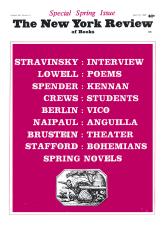In response to:
Salomé Unveiled from the February 13, 1969 issue
To the Editors:
Mr. Anthony Quinton’s criticism of my Frau Lou (NYR, February 13, 1969) is too inane to merit a rejoinder. But I am only human, so here goes.
My manifest purpose in Frau Lou was “to discover the ways in which the works of the mind—whether scientific or imaginative—arise out of personal experience” (jacket copy). Does this purpose really need to be defended? The mind I investigated in this connection was Lou Salomé’s (and incidentally Nietzsche’s and Rilke’s, and Freud’s to the extent of their involvement with her). Was this a poor choice just because she was “an eccentric Russian woman whose only work translated into English is the diary of her relationship with Freud”? As it turned out, when Lou’s personal experience registered in her works, it did so in full detail (however distortedly): should I have skipped the detail? Worse, the relations between her works and her experience proved to be quite complex. Thus a given character or incident in her fiction might represent, at one and the same time, several real persons or occurrences in her prior experience at a greater or lesser remove from her conscious thoughts. When such relations do not admit of facile wording, should they be left unexpressed? Mr. Quinton’s argument that they should be rests on a “specimen” quotation from Frau Lou that is indeed unintelligible out of context.
But Mr. Quinton’s choice quotation from, and against, Frau Lou is a brief passage in which “baby Lou’s anal-sexual cravings are recorded before being duly evidenced.” This quotation is from my preface to Frau Lou—and it cancels Mr. Quinton’s snide allegation that I apparently take it for granted that my reader will nod assent to all the psychoanalytical points involved in that passage (which he enumerates deftly enough for someone who would have Frau Lou serve as a warning against the thoroughgoing scholarly use of psychoanalysis). These are difficult psychoanalytical points, and I do evidence them each and all in due course. In fact the evidence for them almost fills a book: Frau Lou. That is why, in this single case, I could not present the evidence for my analysis of Lou’s personality before, or while, analyzing it if I was to proceed chronologically, as was desirable in all other respects. So I settled uncomfortably for a chronological procedure, with a forewarning in my preface concerning that passage—of which Mr. Quinton mischievously writes that “in general Binion’s psychoanalytical interpretation of Lou is conveyed by this kind of presumptuous intimation.” Actually this passage is unrepresentative of Frau Lou in another, crucial regard, as Mr. Quinton must have realized when he treated it as representative: even though the evidence for baby Lou’s anal-sexual cravings fills most of the book, the psychoanalytical accent falls almost entirely on the unconscious effects of adult experiences after the twenty-eight-page account of her childhood from which Mr. Quinton drew for special effect.
There is no more to Mr. Quinton’s extensive criticism of Frau Lou than this (unless it is my “quarter of a million words of text” and “2,425 bibliographical references”). Maybe, given my stated purpose, my choice of Lou Salomé as a subject was wrong for reasons undisclosed by Mr. Quinton. Or perhaps I misinterpreted many of her deeds and words, or even drew some false tentative inferences from her case about psychology and culture in general. If so, I would be grateful to the critic who said so. But Mr. Quinton disqualifies himself from relevant criticism by calling the book “intolerably difficult to grasp.” Admittedly, it is not within everyone’s grasp. In all candor: did you, dear Editors, pick Mr. Quinton for his short grasp?
Rudolph Binion
Brandeis University
Waltham, Massachusetts
Anthony Quinton replies:
I did not expect that Professor Binion would find my review of his Frau Lou very gratifying. The respect it expresses for his learning, determination, and intelligence is no doubt overshadowed by the unfavorable criticism of his judgment in selecting Lou Andréas-Salomé for an inquiry of this kind, of his capacity for lucid and orderly exposition, and of his assumptions about human nature. On the issue of his judgment: he asks if the attempt to discover how the works of the mind arise out of personal experience really needs to be defended. Stated in this general way, of course, it does not. But his inquiry concentrates on one mind only, a peculiar and not very representative one, whose works, “whether scientific or imaginative,” do not seem to be of any marked intrinsic value as science or art, however fruitful they may be as a source of anecdotal material about Lou’s famous friends and however accessible they may be to psychoanalytic investigation. As for the lucidity of the exposition: Professor Binion says that I disqualify myself as a critic of his book because I admit to having found it “intolerably difficult to grasp.” What I actually said was so hard to grasp was “the precise articulation of his account of her and the way in which the evidence he cites supports it.” I intended this more as a criticism of his mode of reasoning than as an admission of incompetence. The ultimate consensus of intelligent readers must be left to decide which of these is the more appropriate.
This Issue
April 24, 1969



